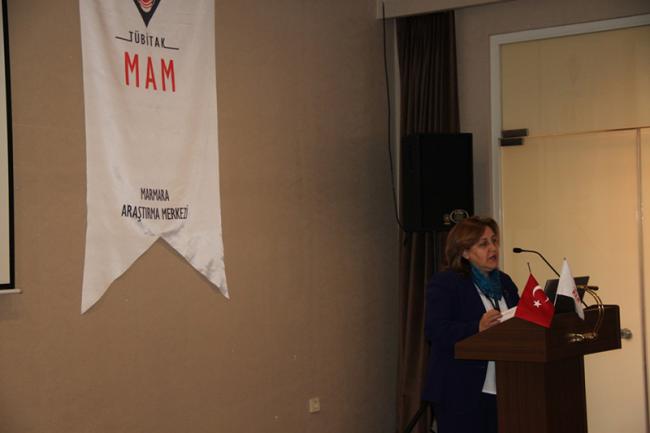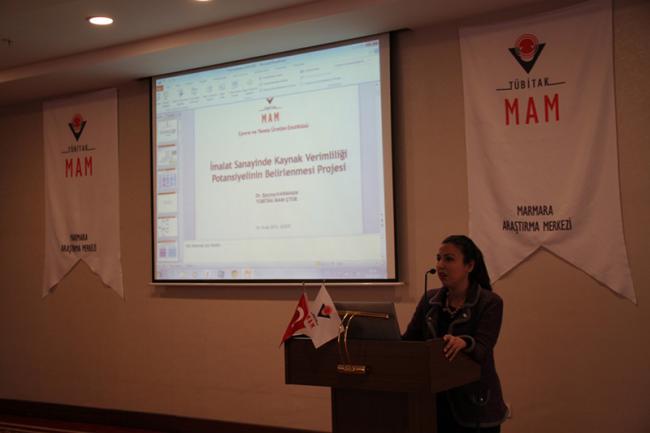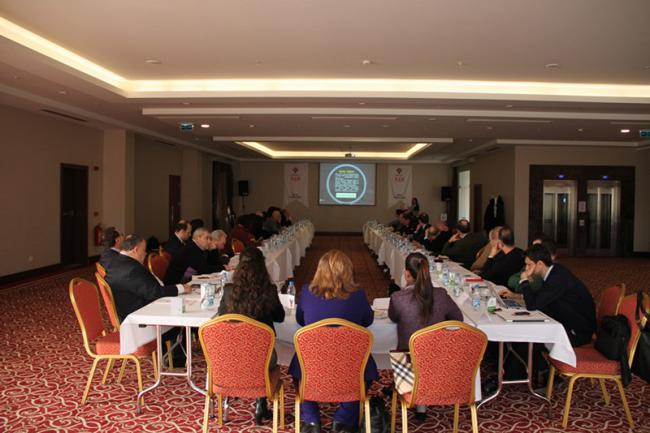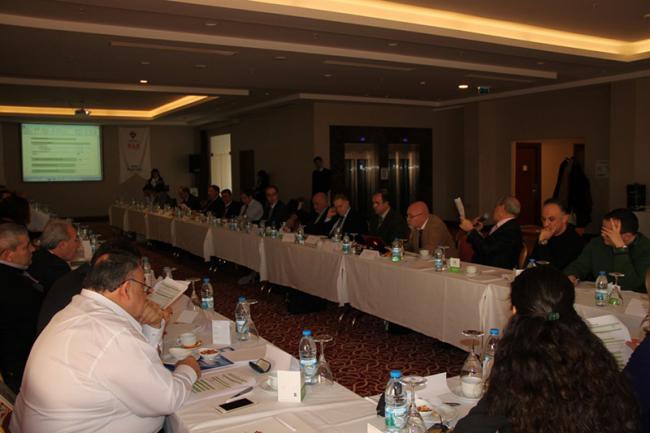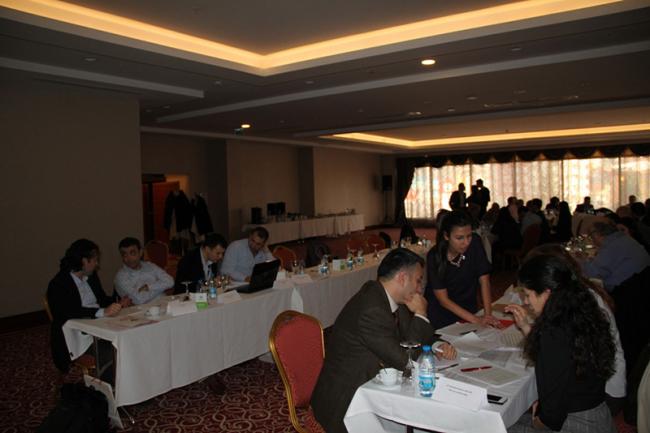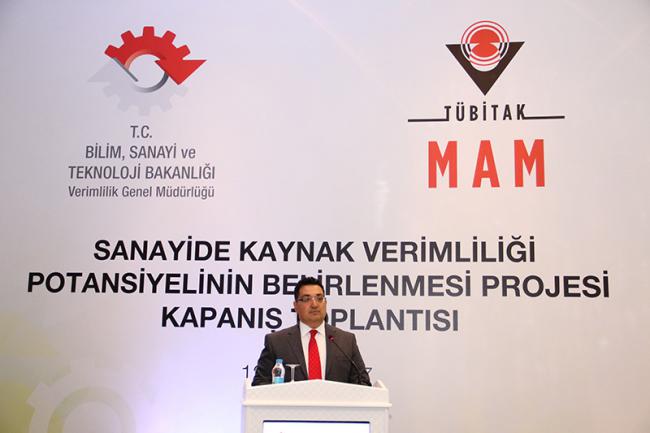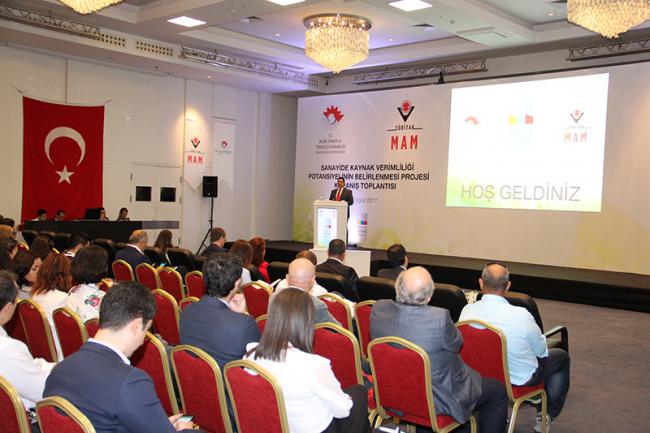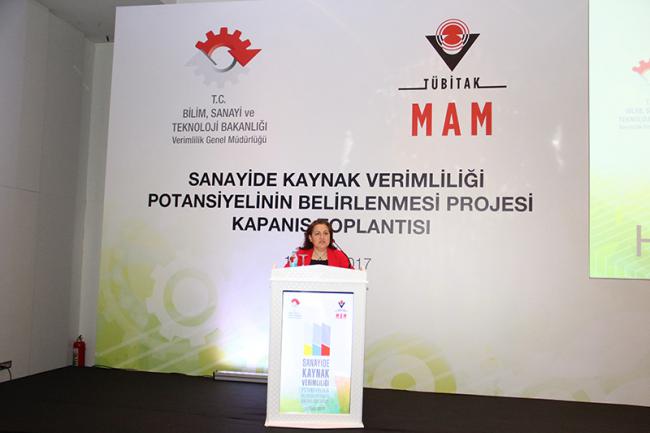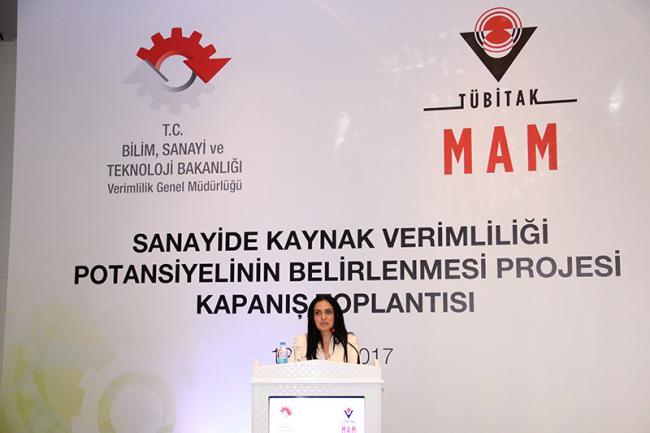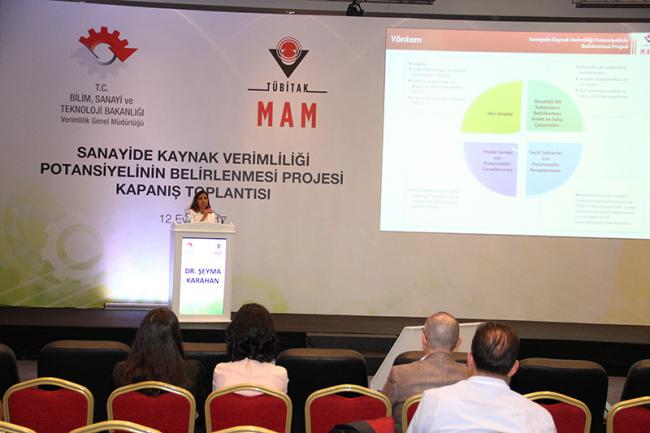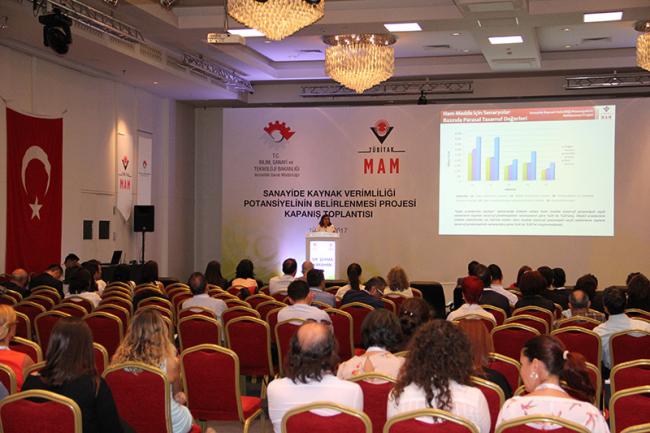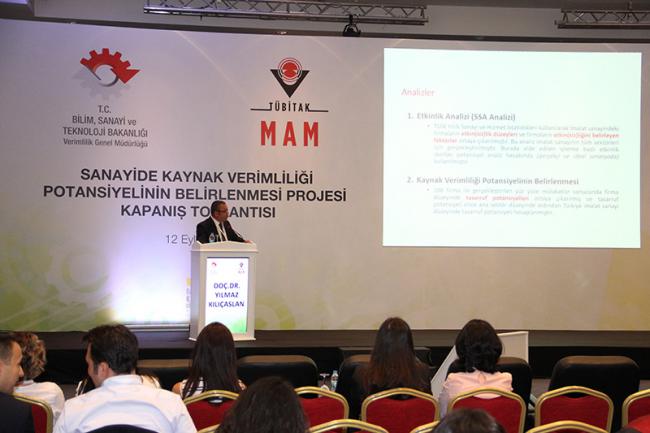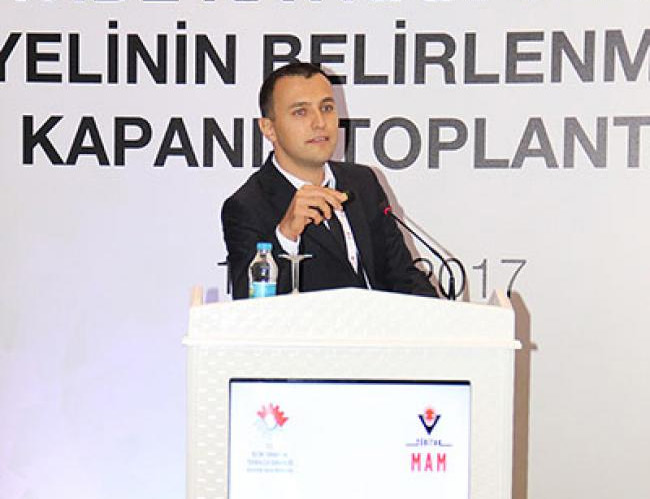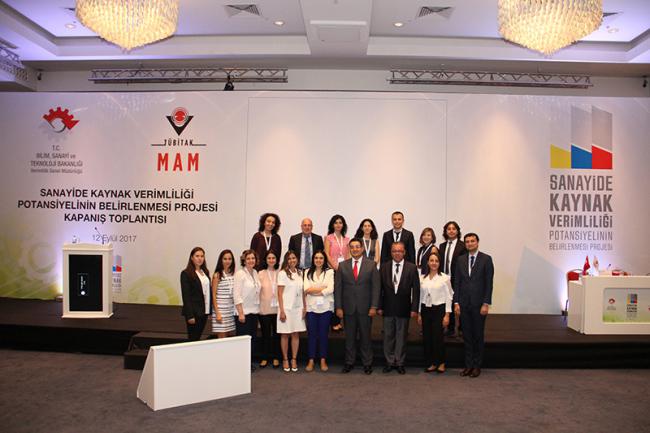Potential Benefits of Resource Efficiency in Turkish Manufacturing Industry
The spread of cleaner production activities based on the principle of minimum resource consumption and waste generation should be regarded as a priority target to ensure efficient use of our national resources, enhance the manufacturing industry's competitiveness and, therefore, reduce environmental impacts. We need sector-based resource efficiency studies because sectors may differ from each other in the manufacturing industry regarding resource utilization and because Turkey’s resources are limited.
Accordingly, the Directorate General of Productivity of the Ministry of Science, Industry, and Technology (MSIT) initiated the project on March 5, 2014, with TÜBİTAK's Marmara Research Center to estimate the Turkish manufacturing industry's resource efficiency potential. The Closing Meeting of the project took place on September 12, 2017.
This project aimed to develop a methodology to analyze the potential savings that can be achieved with effective and sustainable use of raw materials, energy and water at the sector, regional, and Turkish manufacturing industry levels. This study focused on the five industrial sectors, which were selected through various studies, and to estimate this potential in quantitative and monetary terms. These sectors were classified in Nace Rev.2 and consist of (10) Manufacture of food products, (13) Manufacture of textiles products, (20) Manufacture of chemicals and chemical products, (23) Manufacture of other non-metallic mineral products, and (24) Manufacture of basic metal and fabricated metal products.
To achieve this target, resource efficiency potential was estimated in monetary terms for raw material, and both in monetary and quantitative terms for energy and water in five sectors and the whole Turkish manufacturing industry. The estimated potential was generalized to the Turkish manufacturing industry and distributed to the regions. In addition, investments with a payback period of less than and more than one year were identified to achieve the estimated resource efficiency potential.
In addition, we examined the factors affecting resource efficiency positively and negatively in the selected five sectors following the quantitative and monetary resource efficiency estimations. Within this scope, we worked together with sectorial experts for each sub-sector. In addition, we conducted an analysis for environmental impacts to assess the likely environmental benefits if the estimated resource efficiency potential is achieved.
At the same time, this study aimed to provide the relevant parties on the manufacturing industry's resource efficiency for policy-making processes. Another target was to contribute to competitiveness and reduction of pressures on natural resources with higher awareness and more sustainable use of resources.
Outcomes and Outputs
- Report on current status of the sectors and manufacturing industry by examining the literature and statistics in our country
- Report on methodology for estimating the quantitative and monetary savings for the manufacturing industry at sectorial and regional levels.
- Report on resource efficiency potential depending on three scenarios and investment costs
- Final Report
- Report on factors affecting resource efficiency
- Report on environmental impact analysis
- Summary Book
-
Workshop for the Identification of Enterprises
TÜBİTAK MRC Environment and Cleaner Production Institute organized “Prediction of Resource Efficiency Potential in the Turkish Manufacturing Industry-Workshop for the Identification of Enterprises” on January 26, 2015, under the project “Prediction of Resource Efficiency Potential in the Turkish Manufacturing Industry,” initiated by the Ministry of Science, Industry and Technology on March 5, 2014, and conducted by TÜBİTAK Marmara Research Center. According to the NACE Rev. 2 codes, the workshop was attended by the participants from these sectors: (10) Manufacture of food products, (13) Manufacture of textiles, (20) Manufacture of chemicals and chemical products, (23) Manufacture of other non-metallic mineral products and (24) Manufacture of basic metals. Approximately 50 people attended the event including sector associations, unions, and experts as well as TÜBİTAK MRC and Anadolu University’s project team.
The workshop informed the participants about the project and its methodology and evaluated the questionnaire to be conducted one-on-one with the enterprises. It was followed by the examination of the business lists prepared with sector associations and experts for field studies with a focus on priority sub-sectors identified in the project. Small, medium and large sized enterprises were identified in terms of their best available techniques, technological investments/improvements to improve resource efficiency, savings in energy, water, raw materials and waste areas.
-
Closing Meeting
The Closing Meeting of "Prediction of Resource Efficiency Potential in the Turkish Manufacturing Industry" supported by the Directorate General of Productivity of Ministry of Science, Industry and Technology and conducted by TÜBİTAK Marmara Research Center, was held at the Wyndham Ankara Hotel on September 12, 2017, with the participation of related public institutions, academics, sector associations and representatives of various facilities operating in the manufacturing industry.
Starting with the five sectors in Turkish manufacturing industry based on various parameters, we made a quantitative and monetary estimation regarding the potential savings to be achieved at the sector, regional, and industry levels thanks to the effective and sustainable use of raw materials, energy, and water inputs.
The meeting started with the speeches of Anıl Yılmaz, the Director of the Directorate General of Productivity, and Dr. Selma Yılmaz, Director of TÜBİTAK MRC Environment and Cleaner Production Institute.
Mr. Yılmaz emphasized that they carried out activities to improve energy efficiency by increasing productivity as the Directorate General, and he presented examples from various projects. Drawing attention to the importance of "the Project on Resource Efficiency Potential in the Turkish Manufacturing Industry,” he stated that this project is a unique and comprehensive project for Turkey as it provides very valuable outputs for the country. At the same time, he stated that this project would guide resource efficiency and cleaner production practices in Turkey and that the outputs would be utilized in the determination of various policies.
Dr. Selma Ayaz stated that it was necessary to implement clean technologies in order to increase productivity in resource utilization and to reduce the pressure on natural resources in Turkey’s ongoing industrialization process. Also, she said that spreading cleaner production activities would lead to significant rates of resource savings. Also, she stated that applying sector-specific resource efficiency practices would be beneficial because every manufacturing industry sector varies in terms of resource use and because Turkey has limited resources.
In the meeting, Project Coordinator, Industry and Technology Expert Özlem Durmuş provided general information about the project and explained the purpose, scope and targets of the project. In addition, she stated why the ministry designed a project in this area after referring to examples from similar studies in the world.
Later in the meeting, Dr. Şeyma Karahan, the Project Manager of TÜBİTAK MRC Environment and Cleaner Production Institute, explained the method followed in the determination of the sub-sectors and the execution of survey and on-site visits.Starting from the five selected sectors in Turkey's manufacturing industry, quantitative and monetary results of the estimated saving potential in raw materials, energy and water inputs at the sector, region, and national manufacturing industry level were shared with the participants.
After the results were shared, Assoc. Prof. Yılmaz KILIÇASLAN, a faculty member at Anadolu University's Faculty of Economics and a Project Consultant, provided detailed information on the saving analysis methodology developed in the project.He also referred to the difficulties in terms of sampling and Turkey’s data infrastructure as well as the survey applied to the enterprises included in the sample. He drew attention to the importance of the project as a unique method was designed on a national basis.
The final speaker of the meeting, Recep Partal from TÜBİTAK MRC Environment and Cleaner Production Institute, delivered his presentation entitled “Environmental Impact Analysis Methodology and Outcomes.” Recep Partal explained the developmental stages of the environmental impact analysis methodology and shared the results of direct and indirect environmental impact analyses and eco-efficiency analyses. He stated that the achievement of a saving potential with the more efficient use of energy, raw materials, and water could reduce the overall environmental impact by 14.4%-23.5% while increasing eco-efficiency by 12%-25% according to the scenarios.
The Summary Report, Final Report and Environmental Impact Analysis Report of the Project on the Prediction of Resource Efficiency Potential in the Turkish Manufacturing Industry can be accessed at
http://vgm.sanayi.gov.tr/sayfa.html?sayfaId=fa6667a3-32b1-4d34-9f93-0f809109123e.

